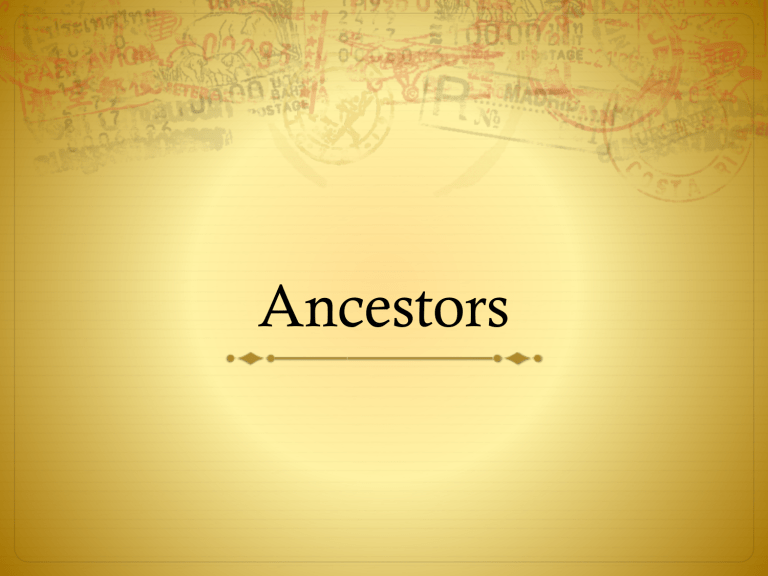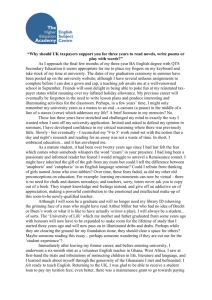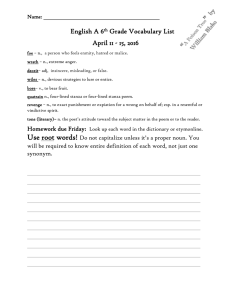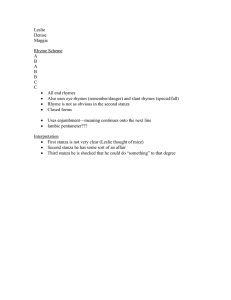Poetry

Ancestors
Words you should know
ancestor
heritage
apprehension
identity
apocalyptic
vision
nocturnal
disorientation
discomfort
ambiguous
predetermined
tranquility
uncertainty
omniscience
divine
Stanza 1
Who are these shadows
That hang over you in a dream-
The bearded, faceless men
Standing shoulder to shoulder?
The figures have a nightmarish quality which is developed through simple but strong visual imagery
They ‘hang over you’ and stand ‘shoulder to shoulder’ which makes them threatening in number and intimidating in their stance
No reference is made to women which also increases the veiled threat implied by the shadowy figures. One possible interpretation of this might be that male ancestors have had a greater impact on his cultural and social identity
Who are these shadows
That hang over you in a dream-
The bearded, faceless men
Standing shoulder to shoulder?
Stanza 1
Connotation- Nightmare vision. There is a distinct separation between the
‘you’ and the ‘shadows’ in the poem, emphasising that the persona is alone while the ancestors belong to each other
Adjective: Connotations of fear, uncertainty, anxiety
Second person pronoun: Draws the reader into the text
Hyphen: The pause reflects the breaks in thought as he considers his uncertainties
Alliteration: emphasises that the ancestors belong together
Rhetorical question: Highlights the persona’s confusion about his acnestors and his own identity. This, combined with the second person pronoun, draws the responder into the text and we are wondering with the persona
Oxymoron: Bearded- age, wisdom.
Faceless- faces are obscured by the dark, lack of clarity
Stanza 2
What secrets
Do they whisper into the darkness-
Why do their eyes
Never close?
The darkness is given a sense of urgency as his sleep is broken by whispered secrets.
Nothing is distinct or clear, developing an atmosphere of uneasiness. It is a scene we can identify with, those disturbing dreams and nightmares that can come to us all in the middle of the night
Reference is made to the everopen eyes of these figures. We wonder what they are looking for and whether their appearance is a negative or positive omen. It also leads us to wonder if these visions are insightful or apocalyptic
Stanza 2
What secrets
Do they whisper into the darkness-
Why do their eyes
Never close?
Connotations: Incomprehensibility, the ancestors whisper. Secrets also suggests a past, untold stories that the persona cannot access.
Recurring image of darkness: connotations of fear, anxiety but also suggests the persona is ‘kept in the dark’.
Rhetorical question: reinforces the nightmarish vision. Image of an oracle
(ancient Rome, woman, prophesy).
Persona feels their omniscience (always present, always watching when he is sleeping).
Stanza 3
Where do they point to
From the circle around you-
To what star
Do their footprints lead?
The ring they form around the poet is both encircling and yet directional, their pointing fingers and footprints leading elsewhere to undetermined places. The term ‘ring’ generates a certain feeling of alarm, as if the sleeping figure is being entrapped by these figures from the past
Directions are unclear, mirroring the unclear quality of dreams. It also raises the level of uncertainty and apprehension (anxieties/ fears) felt by the dreamer
Where do they point to
From the circle around you-
To what star
Do their footprints lead?
Stanza 3
Symbolism: Suggests protective nature (positive) or that the persona is trapped (negative)
Symbolism: Suggestion of divine quality, a ghostly world that the persona is struggling to connect to
Connotation: Suggests path, connection between past, present and future. Future, destiny, history and predetermined future.
Stanza 4
Behind them are
Mountains, the sound of a river,
A moonlit plain
Of grasses and sand.
These nocturnal visitors are given by a natural backdrop, simply described as a mountain, river, plains, grasses and sand
Simple, sensory imagery describes “the sound of river” and a “moonlit plain” giving some idea of place but not enough to get any exact location
It is still a dreamlike landscape, ill-defined but strong and worrying
Stanza 4
Prepositional phrase: The persona only sees from a distance. The place that is presented as behind the ancestors suggests that the ancestors have travelled from a place, reinforces the idea of history.
Behind them are
Mountains, the sound of a river,
A moonlit plain
Of grasses and sand.
Contrasting imagery: Grasses
(living) sand (dead) a contrast is created
Enjambment: creates emphasis on mountain, emphasising the struggles that the ancestors have had to overcome.
Natural imagery: beauty, tranquillity, situates the ancestors in a place and time, a homeland. This moves to a more heavenly image but ultimately the persona is unable to connect as this is a movement towards a spiritual connection that is beyond the personas understanding.
Why do they
Never speak-how long
Is their wait to be?
Stanza 5
We wonder what these speechless, watchful and hovering figures ‘wait’ for and question their purpose
Urgency is created by the use of hyphen which creates a pregnant pause in the middle of the question being asked.
This involves the reader in the questioning process, challenging us to respond from a personal perspective
It appears that these dead ancestors from the past are awaiting new members to join their host, adding strength/depth to the death theme earlier developed
Why do they
Never speak-how long
Is their wait to be?
Stanza 5
Rhetorical question:
Involves the responder
Enjambment: places emphasis on never, suggesting the personas frustration with the recurrence of their images without allowing his insight into their world, purpose.
Hyphen: Indicates waiting. The ancestors will not speak as it is up to the persona to overcome his fear of belonging to their world.
Connotation: Connects to the idea of the secrets that ancestors hold. Here the ancestors never speak because there seems to be a barrier preventing the persona from connecting to them. The barrier is ambiguous, suggesting that it may be the persona's fear of belonging to the world of his family and cultural heritage. He wants their secrets without understanding their cultural world. Is it his attitude that prevents him from belonging to them?
Stanza 6
Why do you wake
As their faces become clearer-
Your tongue dry
As caked mud?
The nightmare quality is not relieved by wakefulness which brings limited relief
Anxiety remains, for consciousness ironically makes their faces disappear just as they “become clearer.” They remain metaphorically out of reach
The visual intensity of the simile “dry/As cakes mud” emphasises the negative impact of this ancestral visitation which neither soothes nor pleases the dreamer
Stanza 6
Why do you wake
As their faces become clearer-
Your tongue dry
As caked mud?
Alliteration: emphasises the change as he wakes from his dream.
Visual imagery: Frustration of waking just as their faces start to become clear. This emphasises the struggle between the two worlds and that the persona is caught between the two.
Sensory imagery: taste- physical effect of the dream, discomfort.
Simile: heightens the responder’s awareness of his discomfort and anxiety about the world that his ghostly ancestors represent.
Stanza 7
From across the plain
Where sand and grasses never stir
The wind tastes of blood
This is the only stanza with three lines instead of four; this adds to the harsh images of un-stirring sand, grass and wind which “tastes of blood.” The inversion of typical senses is unexpected
The reference to the taste of
‘blood’ refers again to the theme and adds to the reader’s sense of nightmarish disorientation
(confusion), mirroring that felt by the disturbed sleeper
Stanza 7
From across the plain
Where sand and grasses never stir
The wind tastes of blood
Prepositional phrase: Ambiguity of where this is. Contrasts of looking forward to stanza 4 where the place was behind the ancestors. Suggests connection between past and future.
Repetition of contrast (living vs dead)- perhaps his inability to be emotionally moved enough to commit to their world.
Sensory imagery: taste, touch. The meaning of this is ambiguous. The wind could be carrying the blood that represents their hardships
(bloodshed), blood lines (family).
The wind could also be a means of time travel, between the past and present.


